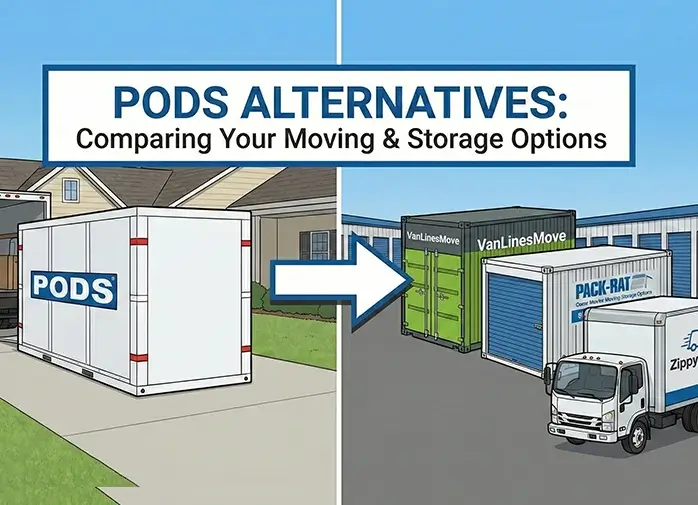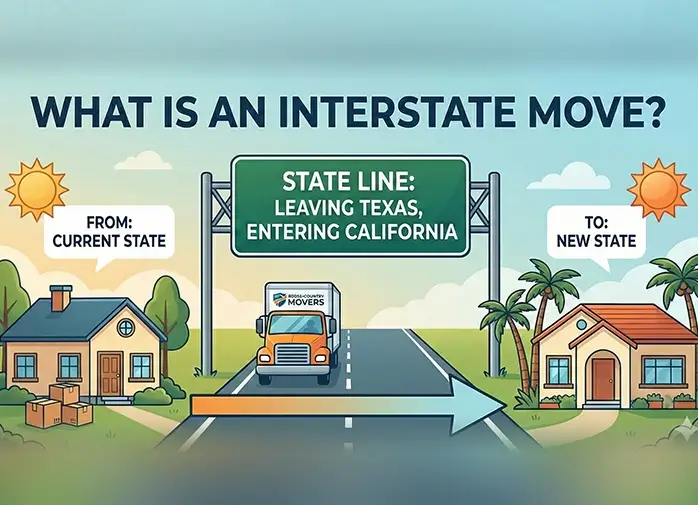How to Tell Your Landlord You're Moving Out?

It is important to provide a formal notice to the landlord to avoid penalties and legal compliance. A proper notice will protect your security deposit. This will allow maintaining a positive rental history and prevent you from blacklisting from the rental market. If you inform your landlord on time, then you will have a smooth transition as everything goes with the right flow. This article will help you find the right strategy about How to Tell Your Landlord You're Moving Out.
8 Ways to Tell Your Landlord Your're Moving Out
Review Your Lease Agreement First
Before you do anything, check your lease agreement, as it is the first step. This is a legally binding document that outlines the terms and conditions of your tenancy.
- Check notice period requirements- When a lease agreement is drafted it mentions a clause that specifies a notice period, which can be 30, 60, or 90 days. Calculating the notice period is important, as misinterpretation can cost you an extra month’s rent. If you fail to provide the required notice, you might have to pay the entire notice period, even if you move out earlier.
- Look for clauses about breaking the lease early- Check the lease carefully regarding clauses addressing early termination and penalties in case of breaking the lease. If there is a clause about early termination, then follow the procedure, like providing a notice period and other necessary steps if required.
- Understand penalties or conditions – While you go through the lease document, check for the penalties or conditions related to the scenario. Some of the common penalties include-
- Liquidated Damages Clause, which is common in early termination, and if you break the lease, it will cost a fixed sum or entire security deposit as a penalty.
- Fees for Re-renting- Some leases may stipulate fees for administrative costs or agent commissions incurred by the landlord to re-rent the property in case of early termination.
- Forfeiture of Security Deposit- If you break the lease or fail to give proper notice, then it allows the landlord to retain your security deposit.
Decide on Your Move-Out Date
- Choose a realistic move-out date- Pick your move-out date carefully, as it will give you enough time to pack, arrange, and clean the house. You can take care of move-out tasks without rushing into anything.
- Coordinate with new housing availability- Connect with your realtor and make sure that the move-out date aligns with the availability of the new residence.
- Consider overlapping dates for a smoother transition- For a smooth transition, it is okay if your moving-out date and moving-in date overlap. This will give you time to clean the old house without any pressure of completing it in one move.
Write a Formal Notice Letter
Even if there is no specific guideline in your lease to provide a written notice, it is better to give a formal written notice. Here is a format for a formal notice letter-
- What to include in the letter: While writing a formal notice, you need to mention some necessary details, including-
- Tenant name and address- Clearly identify the names of all tenants that are on the lease. Also, include the full current address.
- Intended move-out date- Address the notice letter to your landlord using their full name and mailing address as mentioned in the lease. Mention the intended move-out date and the exact date when you are writing the letter.
- Forwarding address (if known)- Provide the new address where your security deposit can be mailed and any final correspondence can be sent.
- Request for final inspection and return of security deposit- In the letter, request the landlord to plan an inspection visit and discuss the security deposit.
- Keep the tone polite and professional- This is a formal notice that can be used for further correspondence in case something goes wrong. So, keep the tone of your letter formal and avoid any possible dispute.
Deliver the Notice Properly
- Send via certified mail or email (check the lease for the preferred method)- When the lease document is drafted, it is mentioned how the communication will take place. There are several options to send the notice like-
- Via certified mail- This is considered the gold standard for sending important legal notice. It is important as in this mode, there will be a “Return Receipt” which is signed by the receiver with their signature and date of receiving. This can be used as proof if there is any dispute later.
- Via Email- Email is quick and convenient. However, its legal standing for formal notices varies by jurisdiction. But, keep in mind, use email as a mode of sending formal notice only if your lease explicitly states that email is an acceptable form of formal notice.
- Hand-deliver with a signed receipt if required- Some landlords prefer hand-delivery of notice, and choosing this method will allow you to obtain proof of delivery. In this mode, prepare two identical copies of your notice letter, hand-deliver one copy to the landlord, and get your copy signed with a date.
- Keep a copy for your records- Keep all the documents in one folder, and it is better to get one copy of each document for backup. During the move planning, keep these documents in a safe place with you.
Prepare for the Final Walkthrough
- Schedule a move-out inspection with the landlord- A final walkthrough is a crucial step of the moving-out process. After handing the notice to the landlord, schedule the move-out inspection. This walkthrough will allow both parties to assess the condition of the property. You can mention some proposed dates for the final walkthrough in your formal notice. Don’t forget to document the final walkthrough to avoid any disputes at the time of returning the security. Clarify all the deductions your landlord points out.
- Clean the rental property thoroughly- Move-out cleaning is considered ethical as you will be leaving the place clean so that the next rental can easily move in. However, there is a clause in the lease about moving out cleaning. Clean the entire house thoroughly, get rid of the junk, and paint the house if needed.
- Repair minor damages to maximize deposit return- If some minor damages are found in the house, repair them before moving out. If you avoid repairs, you might lose some money on your security deposit. Some of the minor damages that require repairing include small nail holes, loose fixtures, light bulbs, scuffs, and marks. For major damages, connect with your landlord and discuss the charges.
Settle Financial Matters
After completing the physical aspects of moving out and walkthrough, check all the financial matters, which would be the final crucial step.
- Pay any remaining rent or utility bills- During your notice period, ensure that your final month's rent is paid in full before the due date. If there is any outstanding rent, then it will be deducted from your security deposit. Also, pay all the utility bills up to your move-out date. Schedule a final meter reading and disconnection with the utility provider on or immediately after your move-out date.
- Confirm process and timeline for returning security deposit- Again, review your lease document to check the stated process and timeline for returning the security deposit. Also, be aware of your local tenant-landlord laws. During and after the final walkthrough, discuss any potential deductions that your landlord suggests.
- Get a clear understanding of when you can expect the deposit typically it is 30 days. Follow up with your landlord regarding the finalization of the deposit.
- Provide updated contact info for follow-ups- It is important to provide correct and updated contact info so that your landlord can have an easy follow-up. If the landlord does not have your updated address or contact info, then you might face a delay in the delivery of the security check.
Be Ready for Questions or Negotiations
- The landlord may ask for reasons or try to convince you to stay- When you hand in the move-out notice, your landlord will ask the reason as they don’t want their property to be empty. They might offer rent reductions and more flexible lease terms. Keep your answer ready about the move.
- Be honest but diplomatic- If you have a straightforward reason, don’t feel shy, and be honest with your answer. Try to avoid negative answers like “We’re planning to move to a property with a garden”.
- Reaffirm your move-out timeline professionally- Stick to the lease when it comes to the move-out timeline. If you have any special requests regarding the move-out date, then connect with the landlord.
Maintain a Positive Relationship
- Return keys responsibly- Be responsible and return all the keys to the house to the landlord on move-out day. This is more than dropping off keys that signify the end of your tenancy. On your moving-out day, return the keys to the landlord and get a receipt confirming the time and date of the key return. If you fail to return the keys on time, the landlord might charge rent for additional days.
- Leave the unit in good condition- It is important to leave the house in good condition, as it is ethical. Clean the house and leave it in the condition in which you moved in. Refer to your lease, which specifies cleaning requirements like deep cleaning of carpet, and more. If there are minor repairs like nail holes, scuff marks, etc, then it's your responsibility to repair them. Remove all the belongings and all types of junk from the property, in case you need to book a junk removal service.
- Thank your landlord- This is a simple gesture to be thankful to your landlord. Even if you have any issues or misunderstandings with your landlord or have any disputes, ignore everything and be formal and thankful.
Conclusion
Moving out of rental property means packing boxes, booking professional movers, renting a new house, and handing over the keys to the rental property. Moving out of a rental property requires adherence to legal obligations and professional communication. While you move out, you need to formally inform the landlord about the move-out date and follow the move-out process mentioned in your lease agreement.
The process is initiated by writing a formal notice about the move-out date and delivering it to the landlord. There are different modes of delivering notice to the landlord, like email. Then, connect with the landlord and schedule the final walkthrough. This will lead to the settling of the finances and facilitate a stress-free move. Following these strategies
FAQ
1. How do you politely tell your landlord you're moving out?
The best way to tell your landlord you’re moving out is by sending a formal written notice as mentioned in the lease.
2. How do you say you're moving out to your landlord?
By writing a formal letter to the landlord, you can inform them about the move-out date.
3. What happens if I don't tell my landlord I'm moving out?
If you don’t tell your landlord that you are moving out, then you have to either pay a penalty or this might cost you your entire security deposit. So, inform your landlord about moving out as stated in the lease.
Categories
- Long Distance Moving154
- Local Moving120
- Commercial Moving40
- Residential Moving34
- Last – Minute Moving25
- Moving Tips & Lifestyle10
- Furniture Moving9
- Moving Tips & How-To Guides8
- Moving services7
- Moving Cost5
- Moving Cost Calculator5
- Moving Costs & Budgeting5
- moving tips4
- Moving companies4
- state to state movers4
- Moving Tips4
- Piano Moving3
- Car Transportation3
- Truck Rental3
- Moving Container3
- Local Move3
- best moving rates3
- cheap moving companies3
- affordable moving companies3
- full-service movers3
- Moving3
- Long-Distance Moving3
- Moving Cost Guides3
- Moving Tips & Planning3
- Junk Removal2
- Senior Moving2
- Senior Relocation Moving Companies2
- Moving Tools2
- Moving Estimates2
- interstate moving2
- College Moving2
- Dorm Moving2
- Tips for moving2
- cross-country move2
- International moving2
- Household moving2
- Relocation Guide2
- Moving Tips & State Guides2
- Moving Guides2
- Heavy Equipment1
- Senior Moving Services1
- office moving1
- office relocation1
- employee relocation1
- Car Transport1
- Vehicle Shipping1
- Car Shipping Services1
- Artificial Intelligence1
- Office Moving Services1
- Commercial Moving Companies1
- Corporate Moving Services1
- Corporate Movers1
- full-service moving companies1
- sustainable moving companies1
- green movers1
- Moving in US1
- Best places to move in 20251
- 2025 moving1
- Full-Service Moving Companies1
- College moving services1
- Moving to College1
- Moving Season1
- Spring Moving1
- donate1
- sell1
- Movers in California1
- Movers in Studio City1
- Moving to California1
- Laws about Moving into California1
- Moving Laws1
- House moving1
- packing1
- cheap moving ways1
- Moving guide1
- moving across countries1
- international relocation program1
- move out cleaning1
- right packing supplies1
- pack while moving1
- Apartment moving1
- PODS1
- moving out1
- state to state move1
- California movers1
- Truck Rental1
- US Territory Relocation1
- International Moving1
- Shipping & Moving Tips1
- Moving Budget Guide1
- Relocation Guides & Incentives1
- Moving Tools & Equipment Guides1
- Moving Services & Options1
- Moving Tips & How-To Guides1
- Moving Day & Settling In1
- Mobile Home Moving1
- Moving Guide & Tips1
- Moving Tips & State Comparisons1
- Moving Tips & City Guides1
- Moving Tips & Cost Guides1
- Long-Distance Moving Tips1
- Moving Tips & Financial Planning1
- Moving Tips & Home Preparation1
- Vehicle Shipping & Auto Transport1
- Marketing & Lead Generation1
- International Moving Guides1
- Moving Costs1
- San Francisco Moving Guide1
- NYC Moving1
- Local Movers1
- Budget Moving1
- Student Moving1
- Affordable Moving1
- Specialty Moving Guides1
- Local & Long-Distance Moving1
- Boston Moving Guide1
- Europe Relocation Guide1
- Moving Costs & Specialty Moving1
- Cost of Living1
- Relocation1
- International Moving1
- Lifestyle & Relocation1
- State Guides1
- Home Buying Guide1
- Moving Timeline1
- Real Estate Tips1
- Appliance Moving1
- Packing & Preparation1
- Interstate Relocation1
- City-to-City Moving Guide1
- Technology for Movers1
- Moving Reviews1
- Moving Costs & Storage1
- Moving Tips & Equipment Guides1
- Moving Guides & Cost Insights1
- Moving Supplies1
- Packing Tips1
- Home Moving1
Archives
Recent posts
-

Best PODS Alternatives for Moving in 2026 (Cheaper, Faster & More Flexible Options)
February 2026 -
.webp)
Plastic Wrap for Moving: The Ultimate Guide to Protecting Your Belongings
February 2026 -

What Is an Interstate Move? Everything You Need to Know Before Moving Across State Lines
February 2026 -

North American Van Lines Reviews: Is It Worth the Cost in 2026?
February 2026

 Local Movers
Local Movers Last-Minute Movers
Last-Minute Movers Junk Removal
Junk Removal Long Distance Movers
Long Distance Movers Piano Movers
Piano Movers Heavy Equipment
Heavy Equipment Commercial Movers
Commercial Movers Moving Container
Moving Container Car Transportation
Car Transportation Furniture Movers
Furniture Movers Truck Rental
Truck Rental Moving Cost Calculator
Moving Cost Calculator Moving Planner
Moving Planner Packing Calculator
Packing Calculator Moving Checklist
Moving Checklist Moving Insurance
Moving Insurance FAQ
FAQ Contact Us
Contact Us Moving Loan
Moving Loan About Us
About Us







